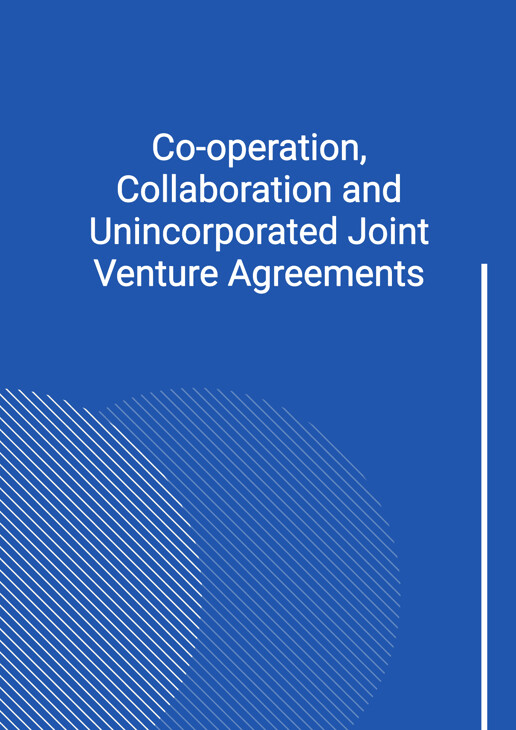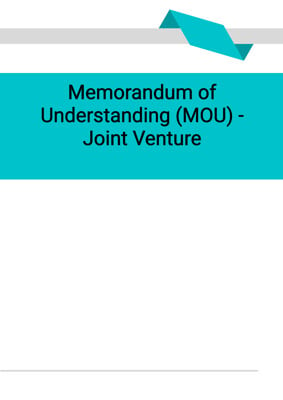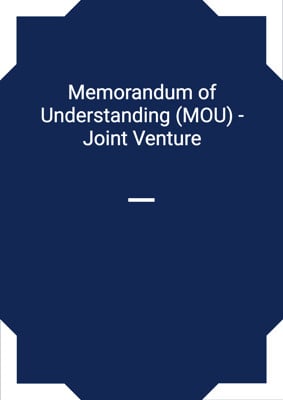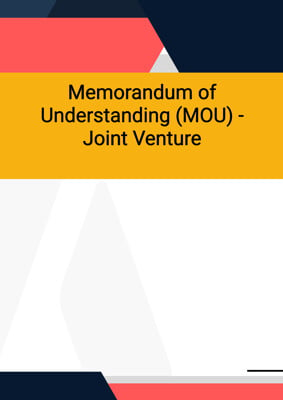How to Tailor the Document for Your Need?
01
Create Document
Click "Create Document" button and the document will be prepared with your account details automatically filled in.
02
Fill Information
Please fill in any additional information by following the step-by-step guide on the left hand side of the preview document and click the "Next" button.
03
Get Document
When you are done, click the "Get Document" button and you can download the document in Word or PDF format.
04
Review Document
Please review the document carefully and make any final modifications to ensure that the details are correct before publication / distribution.
Document Preview
Document Description
In today’s business world, it is very often that two or more parties come together to achieve a common objective without forming a separate legal entity. Parties can pool their resources and expertise to accomplish a specific goal or project, while maintaining their separate legal identities. A temporary nature allows parties to collaborate without formalities and legal requirements. This checklist outlines the important considerations and steps involved in establishing cooperation, collaboration, and unincorporated joint venture agreements.
The first checklist focuses on co-operation and collaboration agreements. It covers various aspects such as the scope of collaboration, responsibilities of each participant, project timetable, background technology disclosure, project know-how, use of know-how, confidentiality, structure of collaboration, project management, modifications, funding, ownership and exploitation of results, liability, force majeure, termination, exclusivity, court or arbitration, and competition law.
The second checklist is specifically designed for unincorporated joint ventures. It addresses key considerations such as the identity of parties, allocation of work, management structure, project leader, joint account, apportionment of profits/losses, funding, performance bonds, liability, intellectual property, staff/labour costs, exclusivity, pricing, termination, default, force majeure, insurance, dispute resolution, choice of law, accounting, and partnership.
The third checklist focuses on obtaining third-party consents. It highlights the importance of reviewing and obtaining necessary regulatory approvals, such as merger control, restrictive agreements, foreign investment controls, industry-specific approvals, export controls, listed company requirements, loans/financing consents, contracts/customers consents, taxation clearances, and employee consultation.
How to use this document?
1. Understand the purpose: Familiarize yourself with the purpose and importance of the document, which is to provide guidance on co-operation, collaboration, and unincorporated joint venture agreements.
2. Choose the relevant checklist: Determine which checklist is applicable to your specific situation - co-operation and collaboration agreements, unincorporated joint ventures, or obtaining third-party consents.
3. Follow the checklist: Go through the checklist step by step, addressing each item and ensuring that all necessary considerations are taken into account.
4. Seek legal advice if needed: If you are unsure about any aspect of the agreement or if your jurisdiction has specific requirements, it is advisable to consult with a local lawyer for legal advice.
5. Customize the document: Tailor the document to your specific needs and circumstances, making sure to provide detailed information and descriptions for each section.
6. Review and finalize: Once you have completed the checklist, review the document to ensure accuracy, clarity, and completeness. Make any necessary revisions or additions.
7. Obtain necessary approvals: If the agreement requires regulatory approvals or consents from third parties, initiate the process of obtaining those approvals in a timely manner.
8. Implement the agreement: Once the document is finalized and all necessary approvals are obtained, implement the agreement according to the terms and conditions outlined.
9. Monitor and review: Continuously monitor the progress and performance of the agreement, and periodically review and update the document as needed.
10. Resolve disputes: In the event of any disputes or disagreements, refer to the dispute resolution mechanisms outlined in the agreement, such as arbitration or court proceedings, to resolve the issues in a fair and timely manner.
Not the right document?
Don’t worry, we have thousands of documents for you to choose from:


























